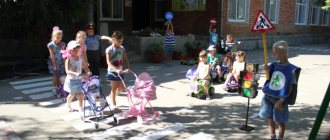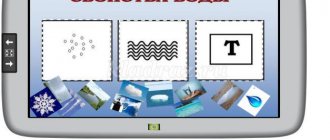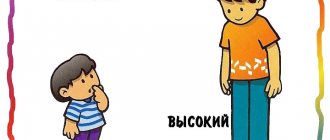Didactic games and aids for speech development of children of senior preschool age
Svetlana Toropova
Didactic games and aids for speech development of children of senior preschool age
Didactic games and aids for speech development of children of senior preschool age
The Federal State Educational Standards requirements for the results of mastering the program are presented in the form of targets for preschool education. At the stage of completing the preschool level, the child must have good command of oral speech, freely express his thoughts and desires, use speech as a means of communication, express his feelings, thoughts, and highlight sounds in words. Speech development of children is very important and relevant in preschool age.
Speech development tasks according to the Federal State Educational Standard:
Mastering speech as a means of communication and culture
enrichment of the active dictionary
development of coherent, dialogic and monologue speech
development of speech creativity
acquaintance with fiction, culture, listening comprehension of various texts, various genres of children's literature
formation of sound analytical-synthetic activity as a prerequisite for learning to read and write
development of sound and intonation culture, phonemic hearing.
To achieve and solve all problems of speech development it is necessary:
creation of a subject-development environment
selection of didactic, developmental, educational games and gaming aids
use of various methods, means, innovative technologies.
personal example of the teacher, his correctly delivered speech
consultations and various forms of work with parents on children’s speech development.
Activating children's speech using a variety of means.
In my work, to activate speech and solve all speech problems, I use the following games and gaming aids:
1. “Loto” using pure phrases for difficult sounds.
Children are offered or children themselves choose their cards, the principle of the game is like an ordinary lotto. The game is complicated by the need to repeat the correct phrase correctly, if the children know how to read, read it. Other reading children can check the correctness of the answer or determine the correctness of the pronunciation. As rewards, you can give not only cards for correct answers, but for example, counting sticks or buttons, pebbles; this is very attractive and energizing for children. If a child experiences difficulty, the teacher needs to help him, because it is difficult the first time, the game requires repetition.
For example: take the picture “Girl with balloons”
The child must repeat or read: “RY-RY-RY, I’M CARRYING BALLS” or For-for-for transparent jellyfish.”
2. “Guess the words”
The cards show two pictures, which may differ from each other when pronounced with the same sound. For example: “Cat” and “Whale”. Children select letters according to the picture, or you can complicate the task - ask a riddle. During the game, the teacher and other participants in the game can come up with riddles and a description of the object themselves. “What picture did I have in mind: this is a fluffy, mustachioed one...” The child guesses and selects the correct letter accordingly.
3. Didactic game “Gifts”
During this game, children develop sound analysis skills, the ability to determine the place of sound in a word.
Children are invited to collect gifts for the boy Roma, but all gifts must have the sound “r”. Children select pictures with a given sound, you can use diagrams, the place of the sound in the word. After the pictures have been selected, you can offer to find these toys in the group and go to visit Roma, then you can develop the role-playing game. There are many game options, fantasize yourself and with your children.
4. Games with punched cards
Punch cards are individual sheets of interesting tasks that are laminated or can be inserted into a thick file for repeated use.
The purpose of each card is different; it can be tasks such as developing phonemic perception, improving the skills of sound-letter analysis, syllabic analysis, reading syllables, composing syllables, words, sentences.
5. "Rebuses"
It’s not difficult to make these cards yourself.
2 strips are glued to the cardboard, one for inserting pictures based on the first sound of which words will be composed, the other below, for inserting letters.
You can use different options:
-which letter is missing (in the middle of the word, at the beginning or end)
- pictures or letters are placed correctly or incorrectly (self-control, mutual control)
- make a diagram
-arrange according to the diagram
6. “Syllable trainer”
Can be used in the role-playing game “School” using the following background:
-help the bear arrange consonants and vowels in the houses
-correct the bear's mistakes
-make up syllables
introduce using the Zhukova simulator to form syllables and words
-identify soft and hard sounds.
Personal trainers
7. Speech snails to reinforce the pronunciation of sounds
I have collected a card index of phonemic nursery rhymes
8. “Syllable Lotto”
The leading activity of preschool children is play; through play, the child learns about the world around him and develops comprehensively. These games contribute to the speech development of children, I hope they will be useful to you too.
Speech development in kindergarten. Program and methodological recommendations. For working with children 2-7 years old
In the context of solving the problems of mental education and the overall development of the child, serious attention is paid to the work of teaching oral speech.
For each age group, the approximate level of speech development, the sequence of work on mastering the sound system of the language, its vocabulary, grammatical structure, dialogic and monologue speech are determined; In older groups, the content of preparing children for mastering literacy has been developed.
In classes on the development of speech and outside of them, in the process of becoming familiar with the surrounding world, nature, as well as while reading works of fiction, the teacher leads children to understand that words denote objects and phenomena of this world and have a certain meaning, which for precise expression thoughts, you need to select the words that are most appropriate in meaning.
Preparing children to master oral speech begins with the first group of early age[1]. In the program of this group, the main objectives are: the development of humming and babbling, which contribute to the development of the articulatory apparatus, auditory concentration, vocal reactions, the accumulation of a passive vocabulary and the formation of the ability to repeat some simple words after the teacher.
The program of the second group of early age, when the child’s speech becomes a means of communication with adults and peers, provides for the formation of correct sound pronunciation and the initial forms of coherent speech.
In the first and second junior groups, teachers create conditions for enriching and activating the vocabulary, and for children to use simple sentences in oral speech.
The middle group program is aimed at children mastering the correct pronunciation of all sounds of their native speech, developing skills in retelling and composing short stories.
In the older group, a special place is occupied by the improvement of phonemic hearing and the further development of coherent speech.
In the school preparatory group, work is actively carried out to prepare children to master the basics of literacy. The teacher leads children to the sound analysis of words, teaches them to divide words into syllables, to compose words from syllables, and from words into sentences, and gives the first ideas about a word or a sentence (without grammatically defining them).
In all age groups, exercises are conducted to develop dialogic speech and create a culture of verbal communication. The teacher develops the child’s independent active speech, encourages the desire to speak and communicate with other people.
The improved version of the program includes a new section “Developing Speech Environment”. Its main goal is to determine the characteristics of the organization of the developing speech environment in all kindergarten groups, as well as to promote the improvement of the child’s speech communications in kindergarten with adults, peers and younger and older children.
In national preschool educational institutions, where work is carried out in their native language, children from the first group of early age are taught oral native speech according to a program developed in the republic, territory, region, and from the middle and senior groups - Russian colloquial speech.
In those preschool educational institutions where work with children of non-Russian nationality is carried out in Russian, from the senior group, teaching the native language is introduced according to educational programs developed in the regions.
Visually - game aid “Speech therapy suitcase”
Visually, the game aid “Speech Therapy Suitcase” is a transformable set of aids that allows you to conduct classes in various areas.
It is made of carpet in the form of a suitcase-album on split rings with filling in the form of a plastic mirror, photos depicting articulation exercises, pictures corresponding to the name of the articulation exercises, letters, numbers, conventional models of sounds, words, prepositions, fairy tale characters and other elements, made of felt on contact tape. Felt has universal properties that allow you to bring almost any idea to life. It is easy to work with, since it does not require special edge processing, pleases with the variety and brightness of the color palette and is pleasant to the touch. Options for games, tasks and exercises using the “Speech Therapy Suitcase” manual (approximate list, since you can come up with endless ideas).
- “Tongue, don’t be lazy, but work hard!”
- "Piano",
- "Palms"
- "Sound House"
- "Make a proposal"
- "Who? What? Signalman",
- "Syllable Engine"
- "Learning to read"
- "Collect the word"
- "Miracle Tree"
- "Whose tail?"
- “Create a non-existent animal”
- “Tell a story”, etc.




